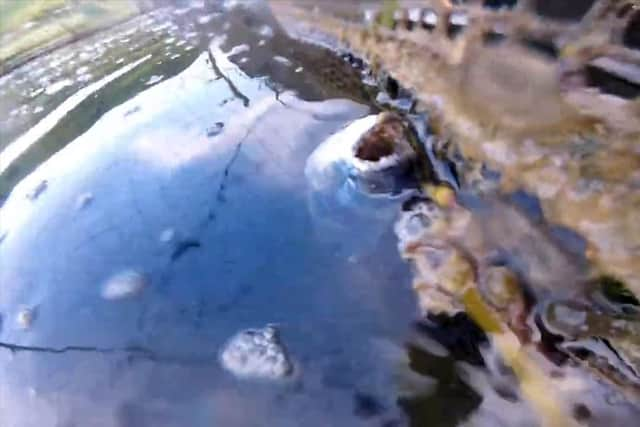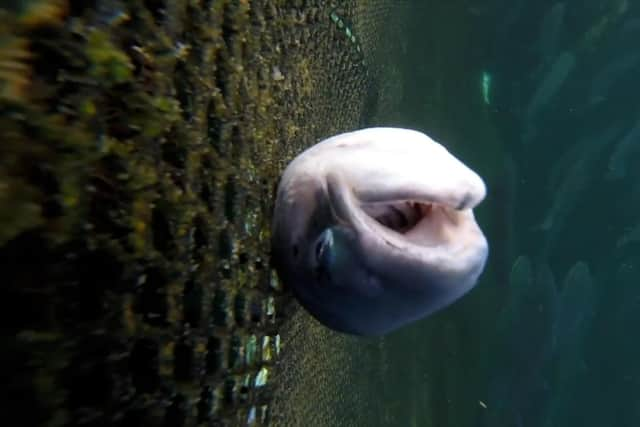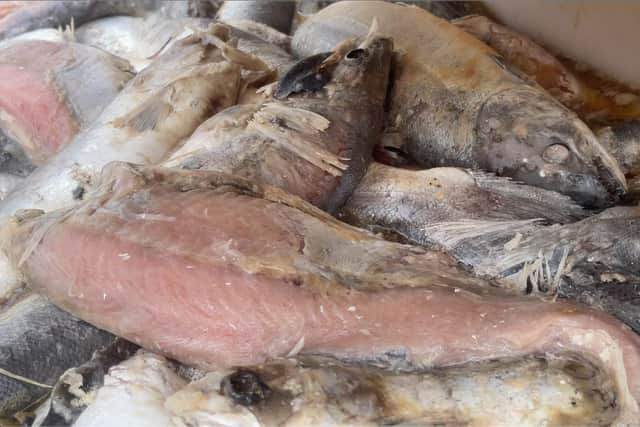Exclusive:Watch: Video footage lifts the lid on high salmon deaths at Scottish fish farms, sparking fears over climate change impacts
Concerns have been raised after the latest official figures revealed an explosion in the number of fish which perished before harvest, with a tenfold increase in early deaths this May compared to a year earlier and the previous month’s total.
And questions over the welfare of farmed fish are being asked after video footage emerged showing salmon in their death throes and giant bins full of dead bodies at a site in the north-west Highlands.
Advertisement
Hide AdAdvertisement
Hide AdA total of ten large containers filled with carcasses have been counted in the past two weeks at a fish farm on Loch Broom, near Ullapool, sparking fears over animal suffering and the causes of the large-scale fatalities.
It’s thought as much as 10 tonnes of dead fish could be contained in the canisters at Corry Sea Farm, owned by Wester Ross Salmon – recently bought over by Norwegian-owned fish farming giant Mowi, which owns a large number of Scottish sites.
According to the most recent statistics published, more than 2.5 million individuals died in May. Sea temperatures, which were up to 5ºC warmer than average during the June marine heatwave, have been considerably warmer than usual since last August and don’t usually peak until later in the year.Salmon fatalities at fish farms ‘double’ in past year, figures suggest
Locals and environmentalists have expressed concern over the ongoing situation.
Sara Nason, coordinator of local community think tank Sea Change Wester Ross, says she is shocked by the magnitude of the deaths.


“I would very much like to know what killed them, the scale of mortalities seems huge,” she said.
The deaths come after official figures showed a dramatic rise in losses of farmed fish in recent times.
Data from the government’s Fish Health Inspectorate and industry reports shows the death rate reached record levels last year, more than double the number reported in 2021.
Advertisement
Hide AdAdvertisement
Hide AdAll-time monthly highs were recorded in September and December 2022, with the biggest fatalities – almost 3.8m in the final month of the year.


Tavish Scott, chief executive of fish farming industry body Salmon Scotland and a former Scottish Government minister, played down losses at the time.
He said: “Throughout the year there will be different environmental pressures that affect survival rates.
“Farm-raised Scottish salmon typically face the biggest challenges in the autumn, when seawater temperatures peak.”


But earlier this week he admitted warming conditions are “definitely a business challenge” for the sector.
He told a specialist fish farming magazine: “No one knows what will happen. We used to have more predictable seasons. The weather jumps around a lot more and the industry has to adapt.
“We do see the effects of climate change, and that’s why the industry must continue to invest. We need to look after the fish as best as possible.”
Farmed salmon is both Scotland’s and the UK’s biggest food export, with around 94,000 tonnes sent to 54 countries across the globe annually.
Advertisement
Hide AdAdvertisement
Hide AdTotal production of Atlantic salmon in Scotland was 205,393 tonnes in 2021 – the highest level yet, generating £760m for the Scottish economy.
Scottish ministers have set out aims to ramp up output, with a target to reach 300,000 to 400,000 tonnes a year by 2030.
However, the industry has been beset by environmental challenges, including high levels of pests and diseases, jellyfish swarms, algal blooms and the impacts of climate change.
Operators face mounting criticism over heavy use of chemicals and medicines, pollution of the seabed and reliance on harmful deterrent devices to ward off predators such as seals.
Some scientists and conservationists have attributed steep declines in Scotland’s wild salmon populations to the expansion of industrial fish farming since its inception in the 1970s.
Nason added: “To witness the tragedy going on inside salmon cages is heartbreaking.”
“These magnificent migratory fish are trapped into pens, crammed in and suffering greatly from a variety of challenges which very often lead to painful premature deaths in massive numbers – as has recently happened.
“Ten large bins of dead salmon – this matters not just because the fish suffer but what it says about Scotland’s moral conscience.”
Advertisement
Hide AdAdvertisement
Hide AdLocal landowner Donald Rice, a film director and theatre producer and the son of acclaimed lyricist Sir Tim Rice, has concerns over ecological damage from salmon cultivation across the west Highlands.
“The type of fish farming practised in Loch Broom by Wester Ross Salmon and Mowi is no longer acceptable,” he said.
“The methods are obsolete and the impact on the wider environment disastrous.
“The calamity of Scottish aquaculture on the west coast seems to have no end.”
Activist Don Staniford, director of farmed salmon protest group $camon $cotland, said: “Salmon farming in Wester Ross is on life-support, with thousands of fish suffering intolerable cruelty and dying cruel deaths.
“Rising water temperatures in the sea, plagues of jellyfish, algal blooms, gill problems, lice infestation and infectious diseases are killing off Scottish salmon.
“Wester Ross Salmon – shamefully accredited as ‘welfare friendly’ via RSPCA Assured –is literally dead in the water.
“Closing down salmon farms in Wester Ross – and across the Highlands and islands – will save the lives of millions of farmed salmon as well as breathe marine life back into coastal communities.”
Advertisement
Hide AdAdvertisement
Hide AdCorry was one of the first salmon farms to be accredited as ‘welfare friendly’ by the RSPCA Assured, formerly branded Freedom Foods, which claims “freedom from discomfort, pain, injury or disease”.
Wester Ross Salmon, which has an international customer base, claims on its website to have “impeccable welfare standards” and is “proud to be RSPCA Assured”.
The company was approached for comment.
A Scottish Government spokesperson said: “A Scottish Government Fish Health Inspector attended the site in May, at which time there were no health concerns.
“The company has since reported increased mortalities at the site and the Inspectorate is liaising further.
“Scotland experienced its hottest June on record and this has created additional environmental challenges for the aquaculture industry.
“The Animal and Plant Health Agency, which is responsible for investigating animal welfare complaints, including farmed fish, is aware of concerns raised.
“We remain committed to the highest standards of fish health and welfare, and are clear in our expectations of producers to drive mortality to the lowest possible levels.
“Our forthcoming Vision for Sustainable Aquaculture is due to be published soon and will set out long-term aspirations for the industry, including outcomes for health and welfare.”
Comments
Want to join the conversation? Please or to comment on this article.